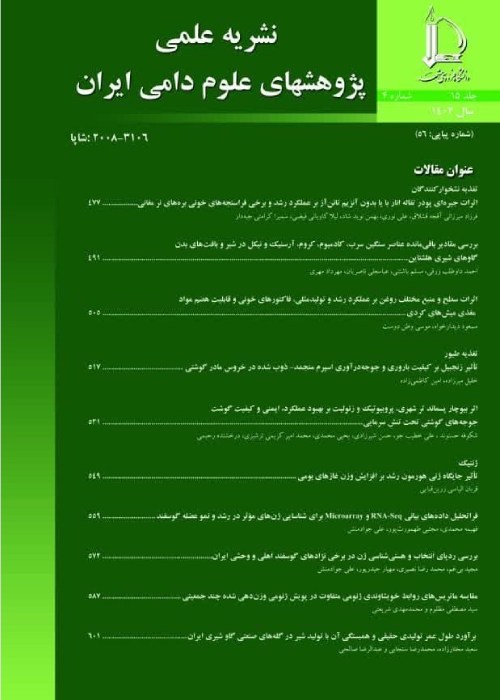Effect of Wet Litter Biochar, Probiotic and Zeolite on Performance, immunity and Small Meat Quality of Broiler Chickens Reared under Cold Stress
During the winter months in most parts of Iran, the external temperature often drops below 0 °C. Typically, these temperatures fall below the optimal conditions for chick growth, resulting in cold stress and potential diseases. This can subsequently impact meat quality negatively and reduce breeding efficiency. The environmental temperature beyond the upper and lower limit of the thermoneutral zone is supposed to produce heat or cold stress in animals (Meltzer, 1983). The adverse climatic condition produces physiological stress which has profound economic influence on the productive efficiency including health and disease resistant capacity (Phuong et al., 2016). Exposure of poultry birds to extreme temperature stressor modulates the immune responsiveness and hematic-biochemical parameters of birds (Hangalapura et al., 2004). Among all the environmental stressors, cold stress induces physiological responses which are of high priority and energy demanding for homeotherms. Cold temperature can increase ascites susceptibility by increasing both metabolic oxygen requirements and pulmonary hypertension (Stolz et al., 1992). The biggest obstacle in raising broilers at high altitudes and cold conditions is the ascites syndrome. This condition can be characterized by an accumulation of fluid in the abdominal cavity and elevated mortality that tends to peak between 4-6 weeks of age (James, 2005). The International Biochar Initiative (2017) defines biochar as, “Solid material obtained from thermochemical conversion of biomass in an oxygenlimited environment.” Biochar is an ash substance that is produced from the burning of biological material via pyrolysis. This process heats the biological material in an anaerobic environment causing it to decompose into an ash form. Growth promotion and therapeutic antibiotics have been used to compensate for the high levels of stress, including cold stress,that can be present in intensive animal production. Stress can lower resistance to many of the microorganisms present in the environment; however, stress in general has been reported to have variable effects on the immune system and can both enhance and suppress responses (Siegel, 1995); cold stress has been shown to both stimulate and suppress chickens’ immune response (Regnier and Kelley, 1981; Hangalapura et al., 2006). Probiotics contain live microorganisms and spores which when administered in adequate amount, confer health benefits to the host. Bacillus subtilis (B. Subtilis) and Bacillus licheniformis (B. Licheniformis) are the two most widely used strains of probiotic bacteria in animal diets. Oral administration of B. Subtilis and B. Licheniformis can have a myriad of beneficial effects, such as improved growth and meat characteristics, optimized composition of intestinal microbiota, prevention of some diarrheal diseases, and reduced stresses. For such benefits, B. Subtilis and B. Licheniformis have attracted considerable attention as a potentially beneficial dietary supplement for animal health. For the many negative effects of antibiotic drugs used in chick production, we want to compare the positive effects of some additives on performance of cold-stressed broiler chickens.
In this experiment, in order to examine the effect of solid waste biochar, probiotic and zeolite on improvement of performance, blood indices and small intestine morphology of broiler chickens reared under cold stress, in a completely randomized design, 315 Ross-308 broiler chickens (as hatched) were allocated to 7 treatments, 5 replicates and 9 birds in each in cold and warm houses. Treatments are including: 1) positive control (basal diet in recommended temperature), 2) negative control (basal diet + cold stress), 3-7) negative control + %0.5, %0.75 and 1% solid waste biochar, 0.02% probiotic Ecobacto-P and 1% zeolite, respectively. In cold stress groups, house temperature decreased to 17° C from 7d until end of the experiment (42d).
As compared to group reared in warm house, cold stress significantly decreased broiler chickens daily FI and BWG, serum total protein, albumin and globulin concentrations, thymus relative weight, lymphocyte percentage, breast and thigh meat pH, breast meat redness (b) and thigh meat yellowness (a) while increased total and ascitic mortality, red and white blood cell count, blood hemoglobin, heterophile percentage and heterophil to lymphocyte ratio, antibody titter against SRBC, breast and thigh meat whiteness and breast meat MDA concentration (P < 0.05).
In order to orthogonal contrast analysis between negative control group and additive groups, solid waste biochar, probiotic or zeolite couldn’t improve broiler chicken’s growth performance, breast and thigh meat quality parameters, blood metabolites concentration and cell count and did not ameliorate negative effects of cold stress.
- حق عضویت دریافتی صرف حمایت از نشریات عضو و نگهداری، تکمیل و توسعه مگیران میشود.
- پرداخت حق اشتراک و دانلود مقالات اجازه بازنشر آن در سایر رسانههای چاپی و دیجیتال را به کاربر نمیدهد.



